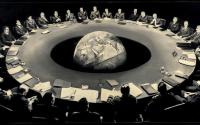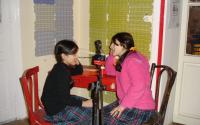2 October 2006Moazzam Begg*
Because I'm in my 30s, I am too young to remember the Vietnam War. But there was a time in my teens when I was fascinated with the subject. Perhaps it was the powerful depictions of the war in the movies "Platoon" and "Full Metal Jacket" that stirred my interest in a conflict that I otherwise believed was unjust. But I remember feeling a strange empathy toward some of the soldiers portrayed in these movies. I read several books about the Vietnam War and always hoped to meet a bona fide vet of 'Nam someday, but there weren't too many in Birmingham, England, and I wasn't planning any trips to the United States.Ten years later, the U.S. came to me. In January 2002, I was abducted from my home in Islamabad, Pakistan, in front of my wife and children. It had been months since we'd evacuated Kabul, Afghanistan, where we had helped establish a girls' school and dig water wells. I was held captive for three years, one in two prisons in Afghanistan, two at the U.S. prison at Guantanamo Bay, Cuba.
It was there, inside an 8-by-6 cell in a maximum-security isolation block, that my teenage desire to meet a Vietnam War veteran was realized. Although I never learned his true age, Sgt. Foshee must have been in his 60s. His job, like the other guards, was to simply watch detainees. He often sat in a chair reading his Bible. Foshee, an Alabaman, spoke with a Southern drawl I'd only heard in shows such as "The Dukes of Hazzard." He was a good ol' boy.He told me about his volunteer tour in Vietnam, often fighting North Vietnamese units in the north of the country. Listening to Foshee from inside my cage, I soaked in his tales of losing comrades during enemy assaults and ambushes and when crossing minefields. He told me how he'd felt when called a "baby-killer" back in the U.S., less than 24 hours after seeing his friends shot or blown to pieces on the battlefield. He told me about how some of his buddies had survived imprisonment in notorious torture camps like the Hanoi Hilton.The anguish of no significant communication with my family (including a son I'd never seen), isolation from the rest of the world, no right to challenge my detention and not knowing what crime I'd committed was eroding my sanity. After almost two years in U.S. custody, much of it in solitary, there were times when I felt I was losing my mind.It was during this time that Foshee spoke to me about North Vietnamese prisons — to give me hope that I would go home someday. Coming from anyone else, his words would have sounded patronizing — even hypocritical. But Foshee understood. He was not happy at the way people were treated in Guantanamo. It was, he told me, no way to win the battle for hearts and minds. He was particularly offended by how younger soldiers mistreated detainees, some of whom were older than he was.Some people think that Amnesty International's description of the camp as the "gulag of our times" is too harsh. Defense Secretary Donald H. Rumsfeld, for instance, recently rejected the "gulag" label, telling conventions of the Veterans of Foreign Wars and the American Legion that Guantanamo is more akin to a holiday resort, complete with a volleyball court, basketball court, soccer field and library.During my years of incarceration, I never once encountered the things Rumsfeld mentioned and never met anyone who had. What people don't seem to understand about Guantanamo is that the prisoners there who protest their innocence have no way to prove it. The principle "innocent until proven guilty" is turned on its head. Everyone's guilty without charges, convicted without a trial. That is why it's like a gulag — even if it's one that provides "Harry Potter" books for reading material (as Rumsfeld noted)."We cannot allow the terrorists' lies and myths to be repeated without question or challenge," Rumsfeld said in his speeches. But where exactly have the "terrorists' lies and myths" been repeated? Detainees at Guantanamo are denied access to media, human rights groups, U.N. representatives, even family members. The many reports of abuse have come from conscientious U.S. military personnel and FBI and CIA agents appalled by some interrogation techniques and camp conditions. Soldiers have been charged with a range of abuses against detainees, including killings (at Bagram Air Base in Afghanistan) that I witnessed.It seems odd, but Rumsfeld lamented in his speeches that too few people will recall how many Medals of Honor were earned in the "war on terror" versus the numbers of detainee abuses. But how can one man's bravery possibly override the abuse of thousands — or even of one detainee?It's little wonder that there are powerful voices — including European allies, former U.S. presidents, Hollywood stars and even veterans of conflicts such as the Vietnam War — joining Amnesty International and former detainees in calling for the closure of Guantanamo.
* Moazzam Begg is the author of "Enemy Combatant: My Imprisonment at Guantanamo, Bagram and Kandahar."
http://www.latimes.com/news/printedition/opinion/la-op-begg1oct01,1,6368801.story?ctrack=1&cset=true






